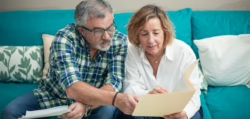
No one wants to be a mortgage slave, particularly when you hit retirement. So what options do you have?
When you reach Preservation Age a myriad of choices opens up.
You can now access your super savings (subject to the rules, of course) without penalty.
For many retirees this will mean the chance to withdraw a lump sum in order to pay down or pay off the mortgage on the family home.
Which will probably bring a great sense of relief.
Given the 10th hike in official interest rates in as many months on March 7, some mortgages are becoming simply unaffordable.
Tough decisions
But accessing super to reduce debt is not as simple a decision as it may sound. Sure the upsides of being debt free are obvious, but there can also be downsides if this reduces your access to funding should unforeseen circumstances arise. And then there can be unintended Age Pension consequences – both good and bad.
What are the rules?
Here’s how the main rules of super and Centrelink eligibility work for those thinking of using super funds to reduce their debt.
And how to ensure that your retirement income needs are met, including what this means for the Age Pension.
Your assets and income are used by Centrelink to assess your Age Pension eligibility. It’s great to see retirees who have worked hard and accumulated a great superannuation balance during their working years. But what if that results in you missing out on Age Pension payments as a result?
Sometimes we need to look at the bigger picture in order to assess our options.
A win for Jenny
Jenny is single, currently aged 67 and retired, with assessable assets of $615,000:
- Super: $530,000
- Bank: $40,000
- Car: $40,000
- Contents: $5,000
- Asset Total: $615,000
She has a mortgage of $160,000 which is causing her stress and starting to erode her regular income.
Under the Assets and Income tests, Jenny is eligible for a part Age Pension of $1,425 per annum (or $55 per fortnight) due to the value of her assets.
She asked Retirement Essentials if it would be smarter to repay her mortgage, using some of her superannuation, which reduces the value of her assets.
New Assets summary (if repaying mortgage from super):
- Super: $370,000 ($530,000 – $160,000 mortgage balance)
- Bank: $40,000
- Car: $40,000
- Contents: $5,000
- Asset Total: $455,000
- Mortgage now $0
Under the Income and Assets tests, Jenny is now eligible for an increased part Age Pension of $13,039 per annum (or $502 per fortnight), as the value of Jenny’s assessable assets has reduced.
Jenny’s assets have reduced from $615,000 to $455,000 after her mortgage is repaid from her super, reducing her super balance by $160,000.
She no longer has a mortgage to pay during her retirement years and has also increased her Age Pension payments from $55 per fortnight up to $502 per fortnight. That’s an increase of $447 every fortnight which equals $11,622 per year – without the stress of steadily increasing mortgage repayments.
Is there a downside?
What works in the example above won’t necessarily be the right solution for everyone. Remember last week we shared the story of Kumar and Carol and their access to an Age Pension which was achieved very differently. They decided to rollback Kumar’s super into accumulation mode as part of the younger spouse strategy.
Some retirees may be making more income from investments within their super, than they might save if they withdrew this super to pay down debt. In their case, what Jenny decided would not have been the best solution.
Pay off or pay down?
And then there is the decision of whether you actually want to pay off your mortgage – or reduce it to a manageable level. Or to nearly zero – say $1000 – which will keep the loan open. There are reasons why each of these three options might work better for you at certain times. If your mortgage includes an Equity Access facility (often called a redraw), reducing it rather than closing it might give you peace of mind because you have funds available if something unforeseen arises. Again, this will depend upon your Centrelink eligibility constraints, your ability to fund mortgage repayments and your risk tolerance. Alternatively, it could be that a two-stage reduction in your mortgage will work better as other assets decrease in value.
Need more support?
As you will have realised by now, there is no simple yes/no answer as to the effectiveness of using money from super to reduce debt. Sometimes it’s a great solution, but not always. It’s possible, however, to plan ahead to most effectively structure your financial assets taking into account Centrelink’s Assets Test treatment of superannuation.
Want to better understand the super versus mortgage strategy options?
Then why not allow one of Retirement Essentials experienced advisers run through all the consequences for your personal situation during a tailored advice consultation.






I receive an aged pension of $530/ fortnight. I’m still working and receive $3000/month. if I stop working will my pension increase?
I’m 68 in June so am of age.
I have a small amount of $35k in super.
Hi Catherine, thank you for your comment! You may be eligible for an increase in Age Pension, it depends on whether Centrelink are using your income or assets to determine your current pension amount. To find out use our free online eligibility calculator HERE to enter in your financials as they would be if you stopped working and see if the amount of pension we present to you is different to what you currently receive.
Many banks will allow a mortgage to be reduced to zero, and still leave you with a redraw option. As long as you have not discharged the loan (which requires some paperwork) then the loan still exists.
We’ve done this and it works well – no increasing interest rates and no mortgage payments, yet the comfort of knowing we can withdraw at any time for emergencies.
Just one tip: Get it in writing, in advance, that the loan will not automatically discharge. If a lender doesn’t allow a zero balance, then leaving a small amount in the loan is the only alternative.
I have recently retired and receive a full single pension from Centrelink. I am in the process of moving a granny flat onto my sons property.
I have no other owned residence, I rent at the moment and receive Rent Assist through Centrelink. Is it a good idea to draw down from my Super to pay for the unit?
How will this effect my pension? I have asked Centrelink about this, their answer being “they are not permitted to offer any financial advise on these topics”.
Hi there, thank you for seeking help on your next steps! Our financial advice consultations are designed to help you better understand your needs and goals in retirement and some of the actions you can consider to help you achieve those goals. The consultation can be either online or via phone call, goes for up to 45 minutes and costs $150.
CLICK HERE to book now.
iS IT POSSIBLE TO HAVE A DIRECT PAYMENT FROM MY SUPER TO MY MORGAGE.?
AS IT, THE COST WHOULD COVER ONE FORTNIGHTLY PAYMENT OF MY DRAW DOWN AMOUNT.I HAVE A MORGAGE OF $23000 AND A SUPER AMOUNT OF $92,000.
Hi Sydney, thank you for sharing your situation! Our financial advice consultations are designed to help you better understand your needs and goals in retirement and some of the actions you can consider to help you achieve those goals. CLICK HERE to book now.
I have a mortgage of 180000 and a super balance of 280000
My wife has a super balance op Approx 100000.
I am 62 and I’m wondering if it would be better to withdraw from my super and pay off my mortgage.
Thanks. Craig
Hi Craig, thank you for seeking our guidance! This is an important topic so it is great to hear you are wanting to learn more about your options and the pros/cons of each. We offer a consultation specifically covering this topic so we can support you to make the best decision for your situation. To make a booking, please CLICK HERE.
Hi, This maybe abit too much for here but I am coming up to retirement in Feb. I owe $200000 mortgage and I have $260000 in Super. The home is valued at approx $600000. I am married and we are thinking about moving overseas and renting the house for 18 months or longer. I see that the pension will be reduced after 26 weeks proportional to the amount of GST that would be paid in OZ. Centerlink has indicated that the rent will be assessed on 1/3 for income and after 12 months the house value will be assessed as assets and the rent as income,as I see it they won’t be paying me a pension (seems the Tax man and Centrelink use differing laws on PPOR) though it is still my principal place of residence. Once this happens would I be then NOT a home owner and what if I pay down the mortgage with super. Can you tell me what are the pros and cons will be please?
Hi Kevin, I’m Sharon, and that is a great question. We’d love to help you, the best way is via a consult to help clarify. We offer General Consultations which have a topic option “Thinking about what I should do with my mortgage” and this is where these can be booked here
hi, thank you for your great information and variety of conversation on the many topics pertinent to retires. I was wondering do you offer investment advice? we are currently paying $6500 pa. previously we were paying $9500. if there is any way we could apprase this sum of money and use it to pay down debt we currently have we’d love to hear from you.
Hi Pat, strictly speaking our advice isn’t aimed at investment advice, however many customers have been pleasantly surprised by how we have been able to help them. I’d recommend booking one of our free 10min consultations HERE where you can explain your situation and the type of help you would like and we can then let you know which of our services would be the best fit for you.
My husband is 62. I am 58. My super is $400,000 with no plans to retire for another 5 years or so. My husbands super is $280 000, with him hopefully retiring in about 3 years. We still owe close to $200,000 on our home loan. Would we be better paying off the loan and continue working with no home loan debt?
Hi Sue, Thankyou for sharing your situation! Our strategy consultations are designed to go over what both options for will look like for you in the long run so you can decide which way is better for you. if you’re unsure, you can book a free 10 minute consultation to see how we can assist.
My husband needs to go to nursing home we have super 500000.00 mortgage 60000.00 other assets 7500.00 -part pension 1018 ea and draw 1540 of from super- should I draw 100000 from super to pay someof mortgage keep some for redraw and put rest on credit cards and draw some cash as need to finish Reno on house – I am 71 husband 72- worried about how to pay Rad etc
Hi Janette, you definitely have an important decision to make! I’d recommend booking in a session with one of our specialists (HERE) who can go through the long term outcomes of each of your options so that you can make the best decision for you and your husband.